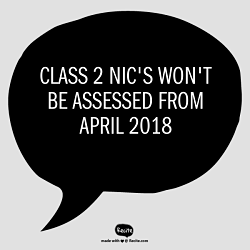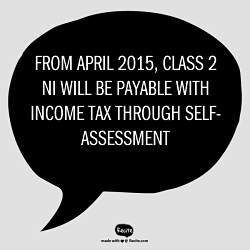 Many sole traders look at their tax position only in terms of the Income Tax payable and sometimes forget to take into account the tax they have to pay as National Insurance (NI).
Many sole traders look at their tax position only in terms of the Income Tax payable and sometimes forget to take into account the tax they have to pay as National Insurance (NI).
It’s easy to understand why NI is often regarded as the “forgotten tax” as the thresholds at which you pay NI and Income Tax differ. You may think that your profits aren’t high enough to pay Income Tax but they may well be above the Class 4 NI lower profit threshold and that means a tax charge of 9% on your profits up to a certain level. Added to the mix, is all the recent talk about proposed reform to NI and the changes announced in the March 2016 Budget.
My blog post below outlines the different types of NI the self-employed are liable to pay, the recent announcements by the government and the key things that you, as a sole trader, need to watch out for.
What type of National Insurance tax do the self-employed pay?
The first thing to get to grips with is the fact that if you are a salary earner, your National Insurance position is very different from that of a sole trader. As an employee you have Class 1 NIC’s deducted from your pay. If you are self-employed you currently pay two classes of NICs: Class 2 and Class 4. You can find out more about the different types of NIC here
 1 – Class 2 NICs
1 – Class 2 NICs
Class 2 NIC’s are flat rate contributions (£2.80 per week in 2015/16). Class 2 NI is liable to be paid for every week of self-employment in a tax year, if the profits for that tax year equal or exceed the Small Profits Threshold (£5,965 in 2015/16).
Class 2 NI used to be paid monthly by direct debit.
These contributions provide the self-employed with the opportunity to build up entitlement to the state pension and other benefits such as maternity allowance. A full state pension is paid only to those who have an adequate record of NI contributions. From April 2016 you will have to have made 35 years’ worth of contributions.
2 – Class 4 NIC’s
Class 4 NICs are paid on the net profits that are subject to income tax. They don’t currently provide any entitlement to contributory benefits.
Class 4 contributions are payable at a rate of 9% on profits between the Lower Profits Limit (£8,060 in 2015/16) and Upper Profits Limit (UPL) (£42,385 in 2015/16) and 2% on profits above the UPL.
Class 4 NI is calculated and paid at the same time as your Income Tax. For the 2015/16 tax year the due date for payment is 31st January 2017.
Class 4 NIC’s are often forgotten about by sole traders calculating their tax because they forget that even if they are earning less than the personal allowance (£10,600 for 2015/16), Class 4 NIC will be payable at 9% of profits over the £8,060 level.
The method of collecting Class 2 NI has changed
If you had been paying Class 2 NIC by monthly direct debit you may have noticed that these charges stopped in July 2015.
The amount you have to pay will now be calculated at the time that you provide all your self-assessment information and payable with Income Tax through self-assessment.
Therefore, the Class 2 NIC for the 2015/16 tax year will be due by 31 January 2017.
It’s worth noting that the Class 2 NI won’t count towards the figure that HMRC use to work out your payments on account. These will be calculated on the addition of your Income Tax and Class 4 NI.
You won’t be charged for Class 2 NI if your profits for the tax year are less than the Small Profits Threshold (£5,965 in 2015/16). The assessment for exemption of Class 2 NI will now be automatic (in the past, you had to judge what level your profits were going to be and apply for a Small Earnings Exemption certificate).
Be careful though, if you have low profits and you don’t have any employment income, it may be worth taking up the option of making voluntary Class 2 NI payments in order to preserve your entitlement to your state pension and certain benefits. If you want to find out more about making voluntary contributions you can read about it here.
National Insurance to be simplified from April 2018
 The government has been working on trying to make the NI tax system for the self-employed less complex and easier to administer and the recent Budget (March 2016) has gone some way towards addressing this goal of simplification.
The government has been working on trying to make the NI tax system for the self-employed less complex and easier to administer and the recent Budget (March 2016) has gone some way towards addressing this goal of simplification.
Class 2 NIC’s will be scrapped from April 2018 and the self-employed will only need to pay one type of National Insurance on their profits, Class 4 NIC’s.
Class 4 NIC’s are going to be restructured to ensure that the self-employed can still obtain their entitlement to state benefits.
Under the proposals, there will be some self-employed earners who will benefit from the new system and earn some benefit entitlement for free. However, for the self-employed who earn below the small profits threshold, the option to pay Class 2 NI voluntarily will cease. This will mean that the only option they will have to make voluntary contributions will be by making Class 3 contributions (currently £14.10 per week). You can find out more about Class 3 contributions here.
What to do next
- For this current tax year 2015/16, don’t forget to budget for the Class 2 NI which will be payable at the same time as your Class 4 NIC and Income Tax
- If your profits are under the Small Profits Threshold, don’t forget that you can still pay Class 2 NI contributions on a voluntary basis to keep up your benefit entitlement
- Keep up to date with the proposed reform. You can do this by signing up for more blog posts just like this one, through my monthly “Tips and Inspiration” for small business owners. You can sign up here or if you need further tax support do feel free to contact me here
Over to you
I hope this post has been helpful? Do drop me a line in the box below if you have any questions.
If you’ve enjoyed this post, please consider sharing with other small business owners using the buttons below. It would mean so much if you did. Thank you.


This is really helpful, Karen – a very clear explanation of a potentially confusing subject!
Thank you Lizzie. I think it’s been incredibly difficult for the self-employed to keep track of all the change relating to NI so I’m glad the post was helpful.In the long term NI will be merged with Income Tax and tax for sole traders should be both easier to understand and calculate.